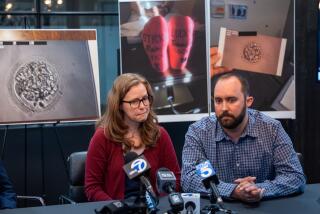Anthrax Vaccine Producer in U.S. Hit With Lawsuit
- Share via
WASHINGTON — The sole U.S. producer of anthrax vaccine, already facing trouble from government regulators, was hit Friday with a private multimillion-dollar lawsuit alleging negligence in its manufacturing procedures.
The suit against BioPort Corp. of Lansing, Mich., was filed in federal District Court here and is believed to be the first action on behalf of soldiers allegedly harmed by vaccine shots they were required to take.
Company spokeswoman Kim Brennen Root said officials could not comment because they have not seen the complaint. Root acknowledged that Food and Drug Administration inspectors had noted deficiencies, but she said the company expects a positive report on its procedures from federal regulators within six months.
The lawsuit, filed on behalf of one dead and one injured soldier, notes that most of those who have received vaccine produced by BioPort are about 150,000 U.S. military personnel. The military began administering the vaccine in the early 1990s, sparked by concerns about the potential use of anthrax as a biological weapon by the Iraqi government.
Unlike antibiotics such as Cipro that are prescribed for people who have been exposed to anthrax, the vaccine is taken as a preventive measure.
The legal complaint alleges that the efficacy of the vaccine in the mass immunization program for the military was never sufficiently tested nor were adverse reactions by soldiers accurately assessed.
“There was insufficient data to demonstrate protection against inhalation anthrax,” the lawsuit says.
The plaintiffs are the heirs of Army Spc. Sandra Larson of Spokane, Wash., who died June 12, 2000; and Ronda Wilson, of Savannah, Ga., a former soldier whose chronic ill health allegedly resulted from the vaccine.
According to the lawsuit, Larson began receiving her six injections in late 1998 and “almost immediately . . . began having adverse reactions to the vaccine, including exhaustion and fatigue, skin rashes and numbness and pain in her hands.”
When these symptoms did not dissipate, she was admitted to a military hospital, where she later lapsed into a coma and died, the complaint said.
Wilson, a helicopter pilot, also began having adverse reactions “almost immediately” after receiving her inoculations in late 1998, including rapid weight loss and an inability to eat solid foods, the lawsuit alleged.
“We’re not trying to stop production of the vaccine,” said plaintiffs’ attorney Alan C. Milstein of Pennsauken, N.J. “But we want to compensate soldiers who were given the vaccine involuntarily and, as a result, were hurt or died while trying to serve their country.
“We would also like to guarantee that others who are vaccinated in the future obtain a product that is safe and effective.”
Plaintiffs charge that the inoculations Larson and Wilson received have been traced to batches of vaccine that in one case were improperly stored for a period at room temperature instead of being refrigerated or, in another case, from a lot that was contaminated with microorganisms.
Some independent authorities noted that, despite claims in the lawsuit, no proof has surfaced that BioPort’s vaccine is defective or harmful.
In a study published two years ago in the Journal of the American Medical Assn., 14 experts in civilian biodefense reported that 590,000 doses of anthrax vaccine had been administered to members of the armed forces and that “no serious adverse events have been causally related.”
The Defense Department has the rights to all anthrax vaccine produced by BioPort, but the company has been unable to release any of its product to the Pentagon since 1998 while awaiting FDA approval, officials said.
Despite remodeling its Michigan plant in 1999, the company has failed to win a new federal license because of deficiencies found during FDA inspections.
Quality-control failures noted by FDA inspectors included the improper reuse of expired vaccine, inadequate testing and the use of lots that failed testing, according to court papers.
The company received $126 million from the Pentagon as part of its efforts to eliminate problems in quality control. Earlier this week, Defense Secretary Donald H. Rumsfeld said the military, as the sole customer of BioPort, was looking at ways to assist the firm.
“What we’re trying to do is figure out a way where we might get some help so that they might improve their performance,” he told reporters.
Rumsfeld said Pentagon officials planned to meet with authorities at the Department of Health and Human Services “to try to fashion some sort of an arrangement whereby we give one more crack at getting the job done with that outfit.”
More to Read
Inside the business of entertainment
The Wide Shot brings you news, analysis and insights on everything from streaming wars to production — and what it all means for the future.
You may occasionally receive promotional content from the Los Angeles Times.










